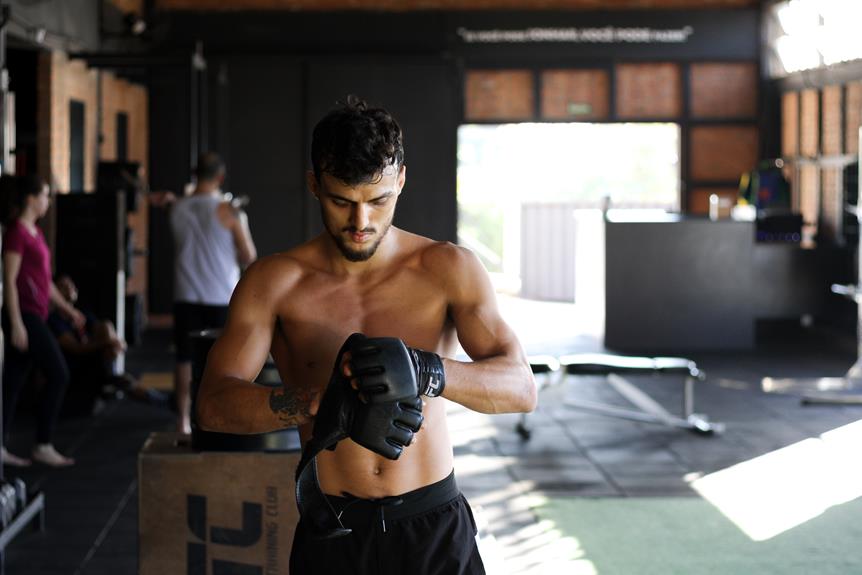In the fiercely competitive world of UFC/MMA fighting, athletes constantly seek ways to optimize their performance and push their physical limits. Training and nutrition play crucial roles, but many fighters turn to supplements to support their rigorous regimens and achieve their goals.
In this article, we will delve into the top ten essential supplements commonly taken by UFC/MMA fighters. From creatine monohydrate to branched-chain amino acids, we will explore the potential benefits these supplements offer in enhancing performance, promoting recovery, and ultimately propelling fighters towards mastery in the octagon.
Key Takeaways
- Creatine Monohydrate, protein powder (whey/casein), pre-workouts and caffeine, and electrolyte supplements are essential supplements for UFC/MMA fighters.
- Caffeine provides various benefits for UFC fighters, including improved energy levels, focus, endurance, alertness, reaction time, and metabolism.
- Other essential supplements include fish oil, beta-alanine, maltodextrin, and ZMA, which provide joint health, muscular endurance, quick energy, and muscle recovery.
- Supplements for weight cutting include protein powder, caffeine, BCAAs, and electrolytes, which help meet protein requirements, enhance focus, preserve muscle mass, and aid in rehydration.
Creatine Monohydrate: Increases Strength and Muscle Mass
The use of creatine monohydrate is a crucial supplement for UFC/MMA fighters as it effectively enhances both strength and muscle mass.
Creatine monohydrate is a naturally occurring compound that is found in small amounts in meat and fish.
It works by increasing the phosphocreatine stores in the muscles, which then helps to regenerate ATP, the primary source of energy for muscle contractions.
By increasing ATP availability, creatine monohydrate allows fighters to train at a higher intensity, resulting in improved performance during fights and training sessions.
Additionally, creatine monohydrate has been shown to increase muscle protein synthesis, leading to greater muscle mass and strength gains.
However, it is important to note that while creatine monohydrate is generally safe to use, it may cause potential side effects such as bloating, gastrointestinal distress, and muscle cramps.
It is recommended to start with a loading phase of 20 grams per day for 5-7 days, followed by a maintenance dose of 3-5 grams per day.
Timing wise, it is best to take creatine monohydrate with a carbohydrate-rich meal or post-workout to optimize its absorption.
Protein Powder: Supports Muscle Building and Recovery
Protein powder plays a vital role in supporting muscle building and facilitating recovery for UFC/MMA fighters. When it comes to protein powders, there are two main types commonly used by fighters: whey and casein.
Whey protein is quickly absorbed by the body, making it ideal for post-workout consumption to kickstart muscle recovery.
On the other hand, casein protein is a slow-release protein that provides a steady supply of amino acids to the muscles over a longer period of time, making it a good choice for bedtime consumption to support overnight muscle repair.
To maximize muscle recovery, it is recommended to consume protein powder within 30 minutes after a workout, as this is when the muscles are most receptive to nutrient uptake. This helps replenish amino acids and promote muscle growth and repair.
Pre-Workouts and Caffeine: Boosts Energy and Exercise Performance
Boosting energy and exercise performance, pre-workouts and caffeine are essential supplements for UFC/MMA fighters. These supplements provide fighters with the necessary energy and focus to perform at their best during training sessions and fights.
Here are three key points to consider:
- The effects of caffeine on cognitive function and reaction time in UFC fighters: Caffeine has been shown to enhance mental alertness, improve reaction time, and increase focus. This can be particularly beneficial during high-intensity training sessions and fights where quick decision-making and rapid reflexes are crucial.
- Comparing the effectiveness of different pre-workout supplements in improving energy and exercise performance for MMA athletes: Different pre-workout supplements contain various ingredients such as beta-alanine, citrulline malate, and creatine, which have been shown to improve energy levels, increase muscular endurance, and enhance overall exercise performance. It is important for fighters to find the right pre-workout supplement that works best for their individual needs.
- The benefits of pre-workouts and caffeine for UFC/MMA fighters: These supplements provide an immediate energy boost, increase focus and concentration, delay fatigue, and improve overall athletic performance. By incorporating pre-workouts and caffeine into their training regimen, fighters can push themselves harder and achieve optimal results.
Electrolyte Supplements: Replenishes Lost Electrolytes During Training
To replenish lost electrolytes during training, UFC/MMA fighters rely on electrolyte supplements. These supplements play a crucial role in maintaining overall hydration and performance.
Electrolytes, such as sodium, potassium, and magnesium, are essential for proper muscle function, nerve transmission, and fluid balance within the body. During intense training sessions, fighters lose significant amounts of electrolytes through sweat, leading to dehydration and decreased performance.
Electrolyte supplements help fighters replenish these lost minerals, allowing them to stay properly hydrated, maintain optimal muscle function, and perform at their best. There are different types of electrolyte supplements available, including powders, tablets, and drinks. Each type offers specific benefits, such as rapid absorption, convenience, and customizable dosages.
Branched-Chain Amino Acids (Bcaas): Supports Muscle Recovery and Reduces Soreness
Branched-chain amino acids (BCAAs) aid in muscle recovery and alleviate soreness for UFC/MMA fighters. They are an essential supplement for athletes looking to optimize their performance and enhance their recovery process.
Here are three key points to understand the effectiveness and benefits of BCAAs:
- BCAAs vs. other muscle recovery supplements: When compared to other muscle recovery supplements, BCAAs have been found to be highly effective in promoting muscle protein synthesis, reducing muscle damage, and accelerating recovery. Their unique composition of three essential amino acids, leucine, isoleucine, and valine, plays a crucial role in muscle repair and growth.
- The role of BCAAs in reducing muscle soreness: Intense training sessions often lead to muscle soreness, which can hinder an athlete's performance. BCAAs help combat this soreness by reducing exercise-induced muscle damage and inflammation. By providing the necessary building blocks for muscle repair, BCAAs contribute to faster recovery and improved athletic performance.
- Improving athletic performance: Besides aiding in muscle recovery and reducing soreness, BCAAs also play a significant role in enhancing athletic performance. They can increase endurance, delay fatigue, and improve muscle strength and power output. By replenishing the body with these essential amino acids, fighters can push their physical limits and perform at their best.
Frequently Asked Questions
Are There Any Potential Side Effects or Risks Associated With Taking Creatine Monohydrate?
Potential risks and long-term effects of taking creatine monohydrate should be considered. While generally safe, possible side effects include gastrointestinal issues, muscle cramps, and dehydration. It is important to follow recommended dosages and consult with a healthcare professional.
How Much Protein Powder Should Ufc/Mma Fighters Consume Daily to Support Muscle Building and Recovery?
In order to support muscle building and recovery, UFC/MMA fighters should consume an optimal amount of protein powder daily. The guidelines for protein powder consumption can vary depending on factors such as body weight, training intensity, and individual goals. Additionally, the timing of protein intake is crucial for maximizing muscle protein synthesis and recovery.
Can Pre-Workouts and Caffeine Have Negative Effects on a Fighter's Health or Performance?
Pre-workouts and caffeine can enhance performance in UFC/MMA fighters by boosting energy, focus, and exercise performance. However, excessive caffeine consumption can lead to negative health effects, such as increased heart rate, anxiety, and dehydration.
What Are Some Natural Sources of Electrolytes That Fighters Can Incorporate Into Their Diet Instead of Relying Solely on Electrolyte Supplements?
Natural sources of electrolytes that fighters can incorporate into their diet as alternatives to electrolyte supplements include coconut water, bananas, oranges, spinach, avocados, and yogurt. These foods provide essential electrolytes like potassium, magnesium, and sodium for optimal hydration and muscle function.
How Do BCAAs Specifically Aid in Muscle Recovery and Reduce Muscle Soreness?
BCAAs aid in muscle recovery and reduce muscle soreness by promoting protein synthesis, reducing muscle protein breakdown, and decreasing exercise-induced muscle damage. They also enhance muscle growth and improve performance during intense training sessions.
Conclusion
In conclusion, the world of UFC/MMA fighting is filled with athletes who are constantly seeking ways to optimize their performance. Supplements play a crucial role in supporting their training regimens and helping them achieve their goals.
From creatine monohydrate to protein powder, pre-workouts, and electrolyte supplements, these essential supplements offer a range of benefits such as increased strength, muscle building, improved energy, and enhanced recovery. By incorporating these supplements into their routines, UFC/MMA fighters can enhance their performance, recovery, and overall well-being.
- 15 Best Martial Arts Weapons (Fighting & Training) - October 14, 2024
- Is Fencing a Martial Art? (Yes, 4 Reasons Why) - October 14, 2024
- 7 Best Martial Arts for Self-defense Ranked (Highly Effective) - October 14, 2024










